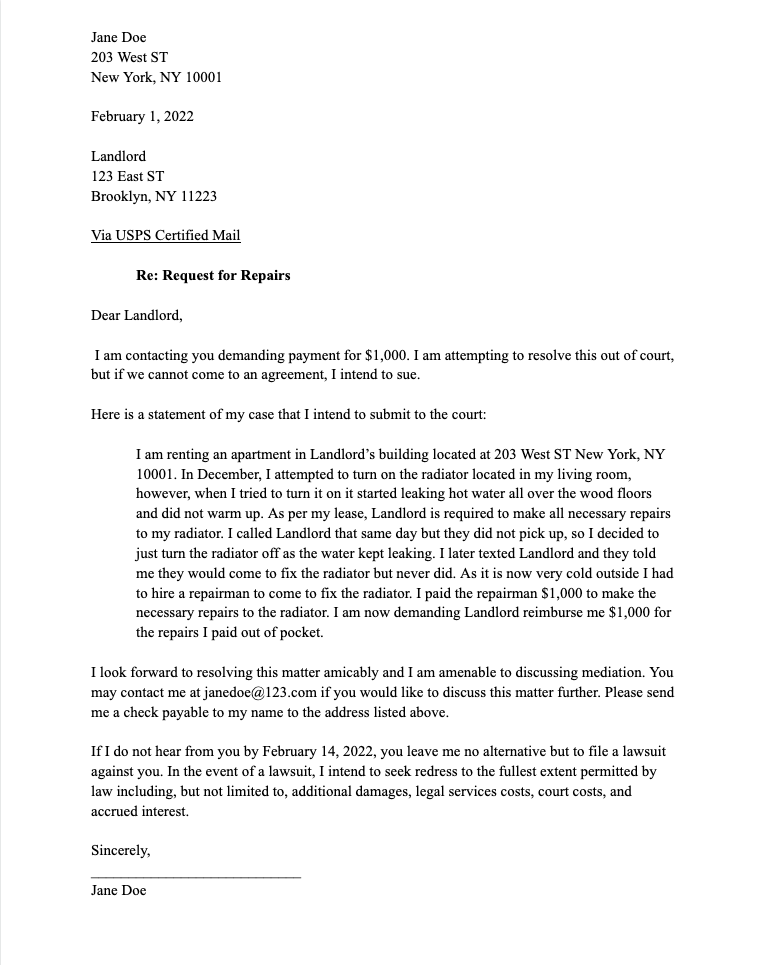You’ve just received a certified letter from your landlord, and your mind starts racing. Why would they send something so formal?
Should you be worried? These are questions you might be asking yourself. Getting a certified letter can be a nerve-wracking experience, especially when it’s unexpected. But before you let anxiety take over, it’s important to understand why landlords use certified mail and what it could mean for you.
A certified letter is not always bad news. In fact, it often serves as a way to ensure important communications are delivered securely and acknowledged. Whether it’s about lease renewals, property maintenance updates, or something else entirely, knowing the reasons can help you respond appropriately and keep your peace of mind intact. You’re not alone in feeling uncertain. Many tenants find themselves puzzling over such letters. So, let’s dive into the possible reasons your landlord might choose this method of communication, and how you can handle it with confidence. Understanding these nuances can empower you and equip you with the knowledge to deal with any situation that arises.

Credit: www.rocketlawyer.com
Certified Letters Explained
Receiving a certified letter from your landlord might seem unusual at first. Certified letters serve specific purposes and offer unique benefits. Understanding why landlords use certified mail helps clarify their intentions. Let’s break down the reasons behind certified letters.
Purpose Of Certified Mail
Certified mail ensures important documents reach the intended recipient. Landlords use it to send legal notices, lease changes, or eviction warnings. This method guarantees the tenant receives vital information. Certified mail is more secure than regular mail.
Tracking And Confirmation Benefits
Certified mail offers tracking and delivery confirmation. Landlords can confirm when you receive the letter. This reduces disputes about whether you received the notice. Tracking provides peace of mind for landlords and tenants alike.

Credit: justicedirect.com
Common Reasons For Landlord Communication
Receiving a certified letter from your landlord can be unsettling. These letters are usually sent for specific reasons. Understanding common reasons helps ease concerns and clarifies the landlord’s intentions. Let’s explore some typical scenarios where landlords might send such communications.
Lease Violations
Lease violations often prompt landlords to send certified letters. Maybe there’s an unauthorized pet in the apartment. Or perhaps tenants are causing noise disturbances. The letter aims to inform tenants of these breaches. It serves as a formal warning. Addressing violations promptly maintains a peaceful living environment.
Rent Payment Issues
Late rent payments can lead to certified letters. Landlords use these letters to remind tenants of overdue payments. They might outline consequences for continued late payments. The letter is a formal request for timely rent payment. It helps ensure financial stability for both parties.
Property Maintenance Notices
Property maintenance often requires tenant cooperation. Landlords send certified letters to notify tenants about upcoming repairs. These letters explain the maintenance schedule. They detail any temporary inconveniences. Clear communication helps avoid misunderstandings. It ensures the property stays in good condition.
Lease Renewal Or Termination
Approaching the end of a lease term can trigger certified letters. Landlords might propose lease renewal terms. Alternatively, they may notify tenants of lease termination. The letter clarifies the landlord’s intentions. It provides details on next steps. This ensures a smooth transition for tenants.
Legal Implications
Receiving a certified letter from your landlord can be stressful. It often signals a serious matter. Understanding the legal implications is crucial. Certified letters serve specific legal purposes. They often involve proof of delivery and tenant rights.
Proof Of Delivery
Certified letters ensure the recipient gets the message. This method provides a verifiable delivery record. It helps landlords confirm tenants received important information. This could be related to lease changes or eviction notices. Such proof is vital if legal disputes arise. It protects both parties from claims of non-receipt.
Tenant Rights And Responsibilities
A certified letter might remind tenants of their rights. It can outline specific responsibilities or lease obligations. Tenants have the right to a safe and habitable living space. They must also meet their lease terms. Ignoring a certified letter could lead to legal actions. Knowing your rights helps you respond appropriately.
Responding To Certified Letters
Landlords often send certified letters for important matters like lease violations or rent payment issues. Such letters ensure you receive and acknowledge the message. Reading and responding promptly is crucial to address any concerns raised.
Responding to a certified letter from your landlord can be daunting. These letters often carry important information. Understanding the contents is crucial. You must address any concerns promptly.Reviewing The Letter’s Content
Start by carefully reading the entire letter. Look for any specific requests or deadlines. Check for legal or formal language. Make sure you understand the landlord’s intentions. Note any mentioned laws or regulations. This helps you know your rights and responsibilities. Misunderstanding the content could lead to problems later.Seeking Legal Advice
If the letter involves legal matters, consider consulting a lawyer. A professional can explain complex terms. They can help you understand implications. Legal advice is beneficial if the letter seems threatening. It ensures you make informed decisions. Protecting your rights is important. Even a brief consultation can be valuable.Communicating With Your Landlord
After reviewing the letter, contact your landlord. Address any questions or concerns directly. Keep communication clear and respectful. This helps resolve misunderstandings quickly. Written communication is best for record-keeping. Email or written letters provide evidence. Good communication maintains a positive relationship. Your landlord may be open to discussing solutions.Preventative Measures
Receiving a certified letter from your landlord can be stressful. But understanding why it happens and taking steps to prevent it can help. Often, it’s about maintaining clear communication and a mutual understanding of expectations. Implementing preventative measures can save you from unexpected surprises and ensure a smooth rental experience.
Maintaining Open Communication
Keep communication lines open with your landlord. Regularly share updates about any issues or repairs. This can help avoid misunderstandings. A simple text or email can prevent issues from escalating. Discussing concerns early can prevent the need for formal letters. Remember, landlords appreciate tenants who communicate well.
Understanding Your Lease Agreement
Read your lease agreement carefully. Understand every clause and responsibility. This document outlines both your rights and duties. Misunderstandings often arise from not reading the lease thoroughly. If unsure, ask your landlord for clarification. Knowledge of the lease can prevent future disputes. Stay informed and stay prepared.
Impact On Tenant-landlord Relationship
Receiving a certified letter from your landlord can feel unsettling. It often carries legal weight. Yet, its impact on tenant-landlord relationships can be significant. Understanding this impact helps maintain a healthy relationship.
Building Trust
Trust forms the foundation of any relationship. Certified letters can strengthen this trust. They demonstrate transparency. The landlord communicates formally and clearly. This removes doubt and builds confidence.
Tenants feel valued and respected. They see the landlord’s commitment to open communication. This trust is crucial for a positive rental experience.
Resolving Conflicts
Conflicts can arise in any tenancy. Certified letters play a key role in conflict resolution. They provide a clear record of communication. Both parties understand the issues at hand.
Clear documentation helps avoid misunderstandings. It ensures both tenant and landlord know their responsibilities. This clarity aids in finding solutions faster. It reduces stress and keeps the relationship amicable.

Credit: www.youtube.com
Frequently Asked Questions
Why Did My Landlord Send A Certified Letter?
Your landlord might need proof you received important information. Certified mail provides that confirmation.
What Could A Certified Letter From My Landlord Mean?
It could mean lease updates, policy changes, or issues needing your attention. It’s important to read it.
Is A Certified Letter From My Landlord Bad News?
Not necessarily. It could be routine matters or required legal notifications. Always read it carefully.
How Should I Respond To A Landlord’s Certified Letter?
Read it thoroughly. Follow any instructions given. Contact your landlord if you need clarification.
Can I Refuse A Certified Letter From My Landlord?
Refusing might cause legal problems. It’s better to accept and understand the contents. Contact a lawyer if unsure.
Conclusion
Receiving a certified letter from your landlord can feel worrying. It’s often about an important issue. Such letters ensure you get the message. It could relate to rent, repairs, or lease changes. Understanding the reason helps you respond effectively. Always read the letter carefully.
If unclear, contact your landlord for clarity. This ensures you stay informed and avoid misunderstandings. Addressing issues promptly keeps your rental experience smooth. Remember, communication is key. Stay informed and proactive. This helps maintain a good relationship with your landlord.
Always handle certified letters seriously for peace of mind.





